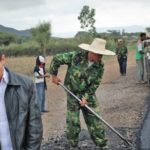Entrepreneurism Gives Me the Ick
Please indulge me a rant, in the spirit and gusto, if not the incisiveness of Sahlins’ Emeritus rant, because feel-good stories about entrepreneurism give me the ick.
Let me clarify: I celebrate self-determination, localisation of power, meaningful partnership. Poverty, Inc. (Miller 2022) correctly identifies colonialism, capitalism and structures of domination/subordination as driving factors behind horrific practices of white-saviourism and counter-productive ‘development’ projects. But I have a problem with the uncritical lauding of entrepreneurship as the solution for un- or under-employment or, in this case, the very real problems of the global aid industry. In Poverty, Inc. the protagonist of Jean-Ronel Noel, co-founder of Enersa, builds a social enterprise making solar-powered streetlights, using labour from marginalised Haitians living in the slums of Cite Soleil. Noel’s success is wonderful, and the positive social changes he brings about for his community ought to be celebrated, especially because of the local and self-determined nature of the company. Poverty, Inc. certainly casts Noel as the hero of the story, including with slightly overdone footage of him strutting through Cite Soleil backed by upbeat funk music with lyrics like:
You’ve got to work for your money
You’ve got to work for your pay
You’ve got to work every minute
You’ve got to work every day
But is this really the attitude we are aiming to develop? A life of toil in a world replete with resources for everyone to live a comfortable life, just intentionally ill-distributed by capitalists? The film does a good job of explaining the structural forces of oppression, exploitation and extraction, so it feels underwhelming that the proposed solution is just as capitalist and neoliberal. Relatively radical alternatives are out there, and meaningfully critique the idea that people must acquiesce to capitalist logics of labour, extraction, and exploitation in order to survive (see, for example, Ferguson 2015).
The problem I see is that for every flashy story about a successful entrepreneur, there are countless others whose ideas fell flat. Perhaps they mistimed ‘the market’, perhaps they failed to find investors, or perhaps their ideas failed to hit the mark: they might have been too radical or, more likely, not commercial enough. Perhaps, like Enersa, they might have fallen prey to global forces of well-meaning but poorly thought-out aid projects. Most likely, their failure is due to market-driven competition from multinational conglomerates who can undercut on price. Before they admit defeat, these other would-be entrepreneurs spend countless hours and their own funds for no reward in a perverse form of self-exploitation. Rather than their labour being exploited by bosses, as is typical in capitalist systems, these poor souls exploit themselves in the hopes of achieving an imagined better future. That Poverty, Inc. attributes the key (and only) challenge to Enersa as the flooding of the market with free solar panels from donors and not the exploitative nature of entrepreneurism itself certainly supports the documentary’s broader narrative about the problems of the aid system, but leaves viewers with the false impression of entrepreneurism. Promoting entrepreneurism is about capturing people in the global capitalist system to expand the consumer market (Dolan and Rajak 2018, 234). In the context of development projects, promoting entrepreneurism continues infantilising narratives of poor people needing (external) support to build their own business or navigate a market.
An explanation of the origin of my ick is, perhaps, in order. In my previous life working on youth policy, entrepreneurship was often touted as a solution to rampant and structurally violent youth un- and under-employment. Incredible amounts of government resources were spent on ‘supporting’ or ‘training’ marginalised young people to be entrepreneurs only for these young people, already cut out of the labour market, to spend months, if not years, toiling away on projects that would never take off. I consistently argued that young people didn’t need skills and training for the chance to make themselves their own boss, rather that money could be better spent creating meaningful entry-level positions, targeted towards marginalised young people, and buttressed with strong trade union and industrial protections.
Dolan, Catherine, and Dinah Rajak. 2018. “Speculative Futures at the Bottom of the Pyramid: Speculative Futures at the Bottom of the Pyramid.” Journal of the Royal Anthropological Institute 24 (2): 233–55. https://doi.org/10.1111/1467-9655.12808.
Ferguson, James. 2015. Give a Man a Fish: Reflections on the New Politics of Distribution. The Lewis Henry Morgan Lectures. Durham London: Duke University Press.
Miller, Michael Matheson, dir. 2022. Poverty, Inc. (2014) | The Global Poverty Industry. https://www.youtube.com/watch?v=ZxgpX39C2sk.
Contributed by SebastianAntoine on 23/01/2023






